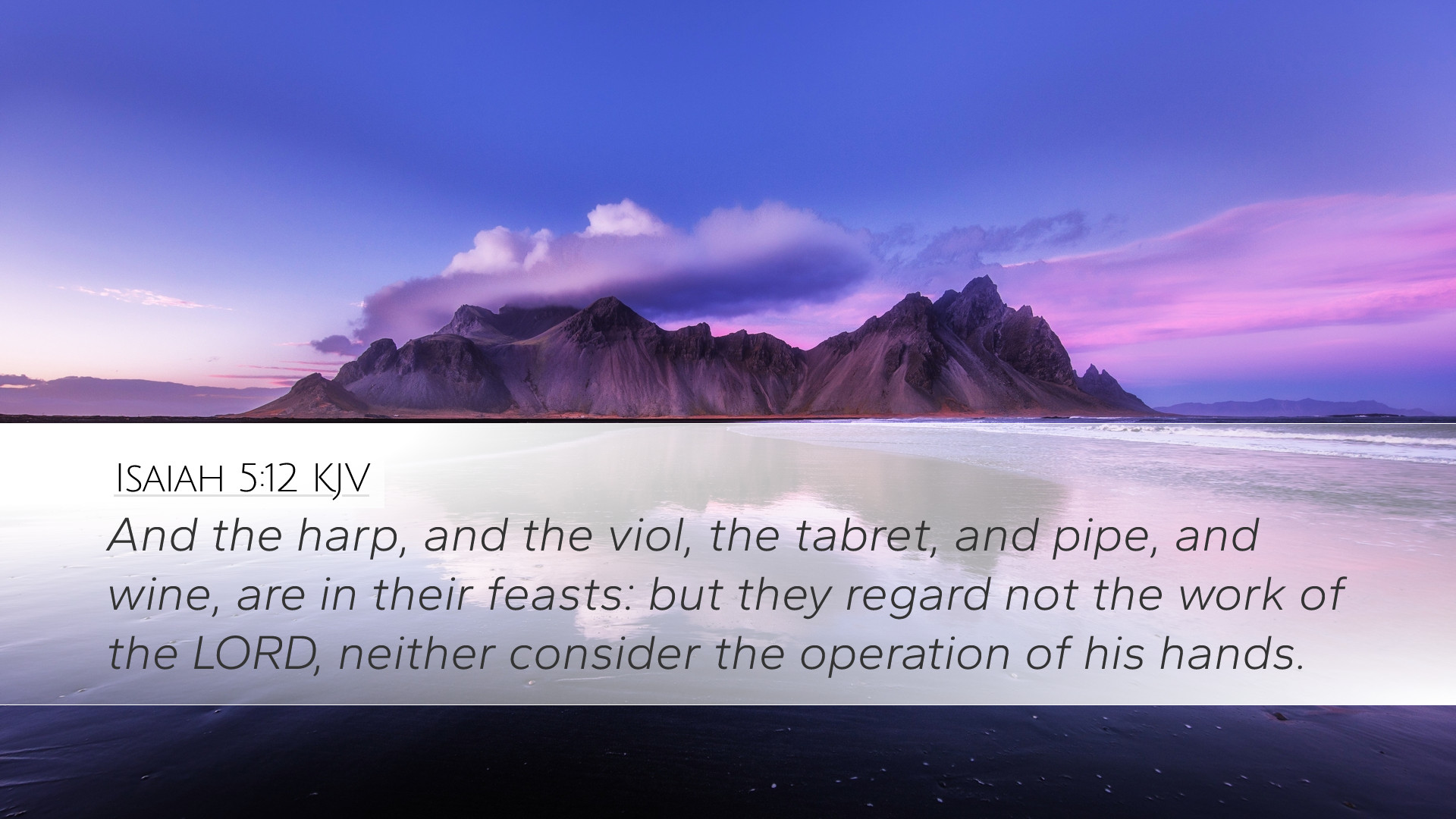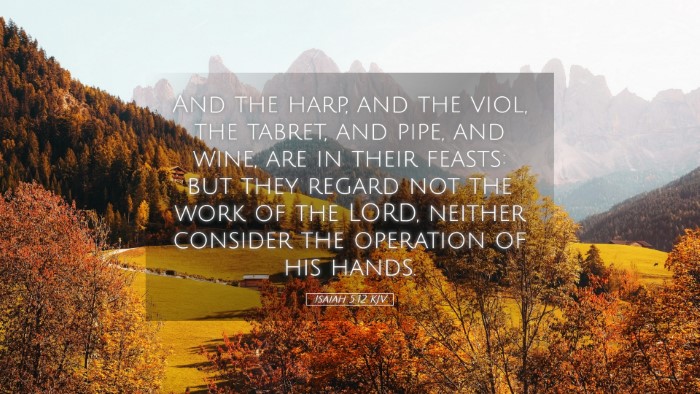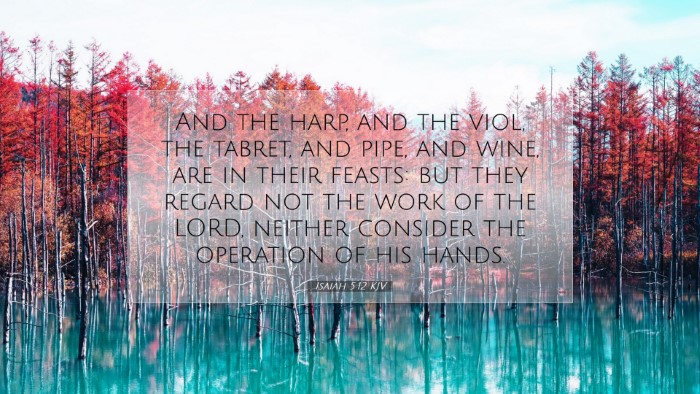Isaiah 5:12 Commentary
Verse Overview: Isaiah 5:12 reads, "And the harp, and the viol, the tabret, and pipe, and wine, are in their feasts: but they regard not the work of the LORD, neither consider the operation of his hands." This verse represents a critical point in Isaiah's prophecy, illustrating the people's disregard for God amid their revelries.
Contextual Analysis
This verse is set within the broader context of Isaiah 5, which is often referred to as the "Song of the Vineyard." The chapter details God's lament for His unfruitful vineyard, symbolizing Israel. The feasting and music mentioned juxtapose the people's physical indulgence with their spiritual apathy.
Public Domain Commentaries
Matthew Henry's Commentary
Matthew Henry highlights the tragedy of the people's condition. He notes that they are engrossed in their festivities and pleasures, losing sight of divine providence. The mention of musical instruments and wine indicates their immersion in worldly joys.
Henry emphasizes the phrase: "they regard not the work of the LORD," pointing to the root issue of spiritual neglect. The people are depicted as having their senses dulled by indulgence, unable to perceive the significance of God's actions and presence in their lives.
He concludes with a warning against becoming too absorbed in earthly pleasures at the expense of spiritual vigilance. His commentary reflects the tension between enjoyment of God's gifts and the responsibility to acknowledge Him as the giver.
Albert Barnes' Notes
Albert Barnes sheds additional light on the imagery in this verse, interpreting the 'harp, viol, tabret, and pipe' as symbols of entertainment and cultural celebration. He posits that the focus on these instruments signifies a deeper moral depravity at play, as the people have turned their joy into a distraction from accountability to God.
Barnes points out the contrast between the joy of feasting and the neglect of understanding God's work. He articulates that this is a common theme in human behavior: prioritizing immediate gratification over spiritual awareness and responsiveness.
Furthermore, he reminds readers that neglecting God ultimately leads to national and personal downfall, as acknowledging God's sovereignty is crucial for harmony and prosperity.
Adam Clarke's Commentary
Adam Clarke provides a detailed exegesis on the cultural context of feasting and merriment in the time of Isaiah. He notes that the people of Israel indulged in their festivities to the point of peril. Clarke emphasizes that wine and joyous music led them into a state of forgetfulness about God's commands and covenant.
Clarke asserts that the passage serves as a potent reminder for contemporary believers. It raises questions about balance in worship and earthly enjoyment. He urges the faithful not to allow distractions to eclipse spiritual obligations and the acknowledgment of God's blessings and governance.
Additionally, he frames this verse within the overarching themes of judgment and repentance found throughout Isaiah's prophecies, urging a deeper introspection about true worship amidst the noise of worldly pleasures.
Theological Implications
Isaiah 5:12 speaks poignantly to several theological themes:
- The Sovereignty of God: This verse illustrates the pervasive need for recognition of God’s supreme role in the world and in the lives of individuals.
- Human Indifference: It captures the tendency of humanity to become preoccupied with temporary pleasures, such as music and wine, while neglecting the needs of the soul.
- Call to Awareness: The passage serves as a call to awaken to God’s work and presence, urging believers to seek a balanced life that honors God amidst their daily affairs.
- Consequences of Neglect: A recurring message in Isaiah is the dire consequences that follow a lack of awareness and gratitude towards God, represented by the looming judgment that comes upon those who disregard His ways.
Practical Application
For pastors, students, theologians, and Bible scholars, this verse opens avenues for deep reflection and practical application:
- Examine Priorities: Individuals are encouraged to reflect on their own lives—are they more engaged in worldly pleasures than in seeking God?
- Encourage Worshipful Celebration: While celebrations are a part of life, they should not eclipse the importance of recognizing God’s work and providence.
- Spiritual Discernment: This verse invites an examination of how cultural practices can sometimes lure believers away from their spiritual commitments.
- Community Responsibility: Church leaders are reminded of their responsibility to guide their communities in understanding the implications of neglecting spiritual health in favor of worldly satisfaction.
Conclusion
Isaiah 5:12 provides profound insights into the spirituality and psyche of ancient Israel, while remaining remarkably relevant for contemporary readers. By harnessing the combined wisdom of Matthew Henry, Albert Barnes, and Adam Clarke, this passage invites reflection on the importance of recognizing God's ongoing work in our lives amidst the allure of daily distractions.


